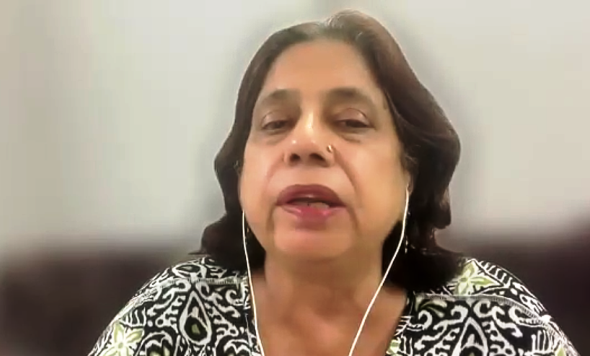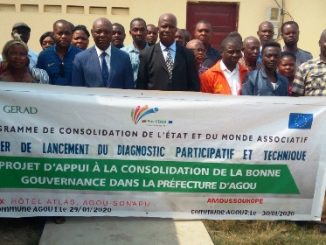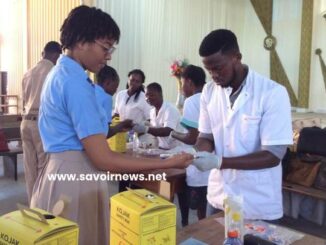
When interviewed at a care center, Afi (22), a person living with HIV, told us that she spends 3,000 FCFA every quarter on the round trip from Kpogan to Lomé for her treatment, even though there are care centers along the Lomé-Kpogan route (about 15 km from Lomé, the Togolese capital).
When asked, she did not hesitate to explain: « It’s because of the stares… I flee as a precaution. It’s a protection strategy. »
« Every quarter, I come from Kpogan to escape the stares. I used to go to a first center. After a few months, I saw my family’s nurse from a distance entering the same center. I then changed centers… This is finally the third center I go to, to avoid discrimination. I make a lot of effort to keep my HIV infection a secret. One of my friends almost died from it… Frankly, stigma is a major public health issue with a significant negative impact, » she explained to us.
Stigma is a poison.
« Discrimination is a poison, I’m telling you. And it’s deadly. People have suffered from it; some have died. Others have spent years moving… Discrimination is one of the consequences of the stigma faced by people living with HIV (PLHIV). But living on the margins of society makes one vulnerable to STIs, and you can also end up losing your self-esteem and giving in to that killer, depression… », Afi added.
The fight against HIV and AIDS is an imperative, and all parts of every nation must contribute because any form of neglect or exclusion creates a pocket of resistance that can reignite the virus’s spread. The reality is that even though care exists, the discrimination that people living with HIV experience is a major obstacle to the response.
Fighting These Traumas
For Koffi (a paralegal and PLHIV), discrimination and stigma are traumas that are difficult to erase… « We face it in our families, at church, at work, on the street. You can be denied a job because of your sexual orientation, and all of this leads to PLHIV becoming homeless and facing poverty, which further complicates access to health services, even though it is their right as human beings, » laments Koffi, who is also an MSM (a man who has sex with another man).
The situation is the same for sex workers (SW), who are often mistreated and even disowned by their family members. Gina (a pseudonym) is a former SW who now helps her peers with preventive measures and the care of PLHIV in her community. For her, discrimination is a real barrier to care. And even if there’s a slight decline, the harm still exists and is part of their daily lives. Therefore, awareness-raising must be stepped up.
The issue of HIV, sexual and reproductive health, and human rights was at the heart of one of the « SHE & Rights » sessions co-organized by Citizen News Service (CNS) and its partners in July 2025.
According to Letlhogonolo Mokgoroane, only 40% of young women in sub-Saharan Africa have a thorough knowledge of HIV prevention.
« In some countries, fewer than 50% of women have access to modern contraception. Gender-based violence remains extremely widespread: in South Africa, a woman is killed every three hours, and one in three women has experienced domestic violence. Victims of violence have a 50% higher risk of contracting HIV, » Letlhogonolo Mokgoroane lamented during the latest « SHE & Rights » session on the issue of HIV, sexual and reproductive health, rights, and justice.
Ms. Letlhogonolo Mokgoroane is a legal representative and head of strategic litigation and research at OurEquity, South Africa. She is also a member of the Johannesburg Society of Advocates.

Much Progress, But Challenges Remain
It should be noted that the development of more effective services to prevent HIV infection and treat PLHIV has already led to a global 54% decrease in AIDS-related deaths and a 52% decrease in new HIV infections between 2010 and 2020. Similarly, in 2020, more than half (73%) of all PLHIV had access to antiretroviral (ARV) treatment, according to UNAIDS statistics.
The UN organization highlights that the last decades on the African continent have been marked by remarkable progress in the fight against the virus: new HIV infections in East and Southern Africa decreased by 57% between 2010 and 2023. Furthermore, the latest UNAIDS report points out that the West and Central Africa region has gone from 54% ARV coverage to 81% in just a few years.
« Today, more than 20 million people in sub-Saharan Africa have access to antiretroviral treatment, which demonstrates the commitment of governments, communities, and international partners, » said Letlhogonolo Mokgoroane during her presentation.
She did, however, specify that this progress does not benefit the entire population, and groups facing discrimination and stigma are often left behind.
« Quite often, it’s the stigma and discrimination that people are or could be victims of that pushes them to no longer have access to the services they need, » she explained, emphasizing that the road is far from over.
« In 2024 alone, an estimated 800,000 new HIV infections occurred in sub-Saharan Africa, 63% of which were among women and girls. Adolescent girls and young women aged 15-24 are more than twice as likely to contract HIV as their male counterparts, » she said, stressing that these figures remind us that HIV remains a public health crisis.
But HIV is not just a medical problem: it is intimately linked to social, economic, and legal factors.
« To truly end HIV as a public health threat, we must look beyond the virus itself and address the broader context in which it spreads, » Ms. Letlhogonolo added.
Choosing the Right Path: The Rights-Based Approach to Ending AIDS
She explains that the criminalization of homosexual relations and sex work drives key populations underground, depriving them of essential health services.
« In 31 African countries, homosexual relations remain criminalized, which complicates LGBTQIA+ people’s access to HIV prevention and care. Sex workers, who are 13 times more likely to live with HIV than the general population, are often victims of harassment and violence, which further increases their vulnerability. Discriminatory laws and policies against people living with HIV, LGBTQIA+ people, sex workers, and other marginalized groups not only violate human rights but also fuel the epidemic. »
She cited the case of Nigeria, where the law banning same-sex marriage led to a 41% drop in access to HIV-related services among men who have sex with men.
For Pam Ntshekula, a passionate advocate for the rights and safety of sex workers and a lobbying officer at the Sex Workers Education and Advocacy Taskforce (SWEAT) in South Africa, the complete decriminalization of sex work is crucial to improving the health, safety, and rights of sex workers.
Criminalization forces sex workers to avoid clinics due to fear of stigma and mistreatment. This limits their access to sexual health services, hinders health prevention and education, and negatively impacts their mental health. According to Pam Ntshekula, a lobbying officer at SWEAT in South Africa, the complete decriminalization of sex work is crucial to improving the health, safety, and rights of sex workers.
For her part, Abhina Aher, Executive Director of the TWEET Foundation and former President of the Asia-Pacific Transgender Network, laments the intersectional stigma faced by transgender people. She pointed out that many have been fired simply because they are transgender.
« I used to work for USAID. I lost my job simply because I’m transgender. A lot of transgender people have lost their jobs, » said Abhina Aher, Executive Director of the TWEET Foundation and former President of the Asia-Pacific Transgender Network.

The Right to Health and Gender Equality Are Intrinsically Linked
For Shobha Shukla, a journalist and women’s rights activist, we must ensure that gender equality and the right to health are recognized as fundamental human rights in all countries.
« The right to health is inseparable from gender equality and human rights. Progress towards SDG 3 continues to be hindered in the Asia-Pacific region, particularly concerning universal access to sexual and reproductive health and rights; communicable and non-communicable diseases; universal health coverage; and access for all to vaccines, diagnostics, and medicines, » said Shobha Shukla, a keynote speaker for SDG 3 at the United Nations High-level Political Forum (HLPF 2025).
« Essential health services must include sexual and reproductive health services, including safe abortion and post-abortion care, menstrual hygiene, and mental health services, with special attention paid to women, adolescent girls, people with disabilities, indigenous populations, diverse gender communities, the elderly, young people, migrant workers, refugees, people living with HIV, sex workers, and drug users, among others. They must also include all health and social support services for survivors of sexual and gender-based violence, » she added.
The Call for Tolerance
« There are no laws, strictly speaking, that protect sex workers in Togo. Even law enforcement officers who are supposed to protect us as citizens abuse us, and there is no point in going to complain: they ask you in front of everyone what you do for a living, and you’re shamed. Our people who suffer sexual abuse don’t talk about it because it would be pointless. If the environment is favorable, it promotes better care, and PLHIV would feel more secure, » Gina explained at length.
She calls for more tolerance at various levels, as it is a matter of health and life. « We are all human beings. The fight against HIV must take into account all components of society. No exclusion helps to achieve the goals, » Gina added.
It should be noted that the national second-generation surveillance survey conducted in 2023 (SSG2023) indicates that the prevalence is 8.7% among MSM and 5.8% among sex workers, while it is 1.7% in the general population.
According to the Human Rights Observatory (ODH), a tool of the Network of Associations of People Living with HIV/AIDS (RAS+), in 2024, 60,629 people were sensitized on human rights related to HIV in Togo. Among them, 139 sex workers and 645 men who have sex with men (MSM) received preventive information. Furthermore, health providers and resource persons were trained to improve access to care and dedicated services. The Observatory’s mission is to help achieve national HIV/AIDS objectives by improving respect for the rights of PLHIV, sex workers, and MSM.
« The fight against HIV can only be effective if it is based on respect for human rights, » said Ms. Kanny Yayé Diallo (UNAIDS Country Director for Togo and Benin) during the presentation of the latest report on the national response.
She lamented the lack of reporting on discrimination cases, insufficient awareness-raising activities, and weak support for volunteers and survivors.
The national coordinator of the Permanent Secretariat of the National Council for the Fight Against AIDS, Viral Hepatitis, and Sexually Transmitted Infections (SP/CNLS-IST), Professor Vincent Palokinam Pitché, insisted on the importance of solidarity in the HIV response: « Solidarity is not a favor, but a right. Every individual deserves respect, dignity, and equal opportunities, » he said at the end of the meeting.
If we intensify prevention, work to eliminate gender inequalities, and put an end to HIV-related stigma and discrimination, then we will be on the right path to ending AIDS as a public health issue.
Ambroisine MEMEDE



